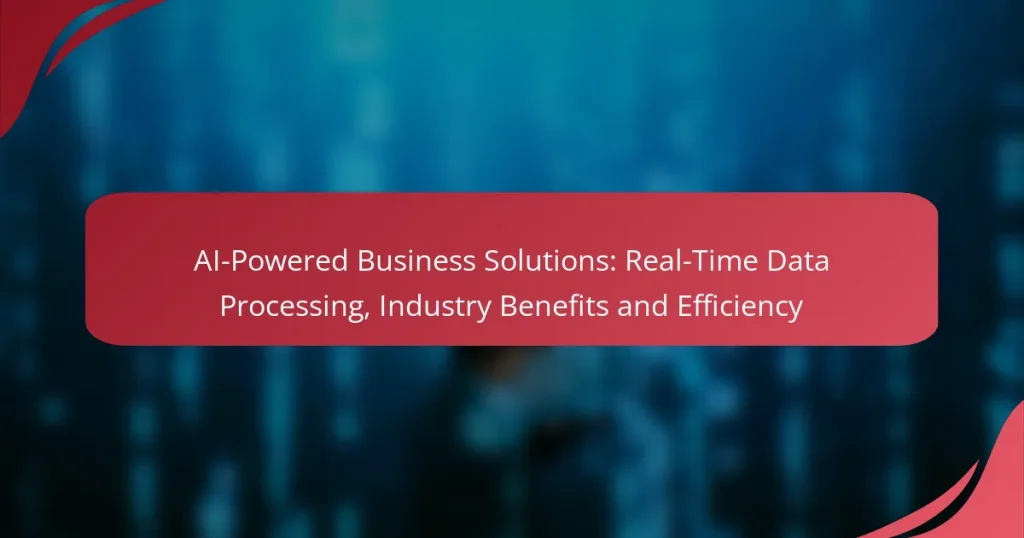AI-powered business solutions are revolutionizing real-time data processing by automating the collection and analysis of information, allowing organizations to make informed decisions quickly. This technological advancement not only enhances efficiency and reduces costs but also empowers industries like retail, healthcare, and manufacturing to optimize their operations and improve customer experiences.
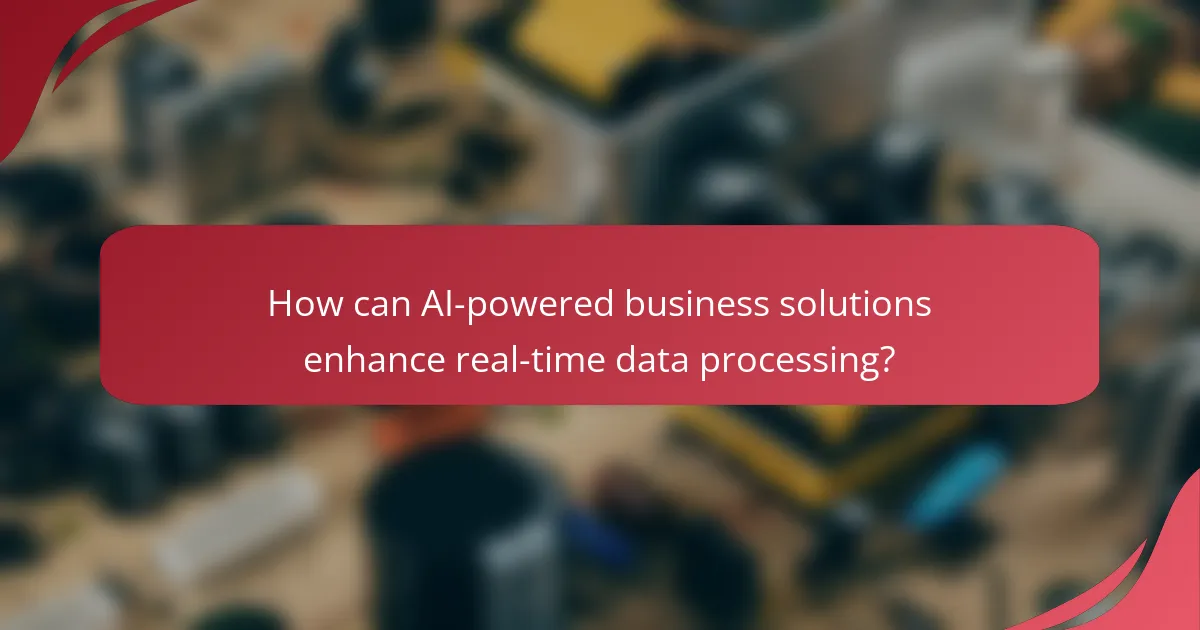
How can AI-powered business solutions enhance real-time data processing?
AI-powered business solutions significantly enhance real-time data processing by automating data collection, analysis, and decision-making. These technologies enable organizations to respond swiftly to market changes and operational challenges, improving overall agility.
Improved decision-making
AI enhances decision-making by providing timely insights from large volumes of data. By leveraging machine learning algorithms, businesses can identify patterns and trends that inform strategic choices, reducing reliance on intuition alone.
For example, a retail company can use AI to analyze customer purchasing behavior in real-time, allowing them to adjust inventory levels and promotional strategies instantly. This data-driven approach leads to more accurate and effective decisions.
Increased operational efficiency
AI-powered solutions streamline operations by automating repetitive tasks and optimizing processes. This reduces human error and frees up employees to focus on higher-value activities, ultimately leading to cost savings.
For instance, manufacturing firms can implement AI to monitor equipment performance and predict maintenance needs, minimizing downtime. This proactive approach can enhance productivity by ensuring that operations run smoothly and efficiently.
Enhanced customer insights
AI tools provide deeper customer insights by analyzing behavior and preferences in real-time. This allows businesses to tailor their offerings and improve customer engagement, leading to higher satisfaction and loyalty.
For example, an e-commerce platform can utilize AI to recommend products based on a customer’s browsing history and purchase patterns. This personalized experience not only boosts sales but also fosters a stronger connection between the brand and its customers.
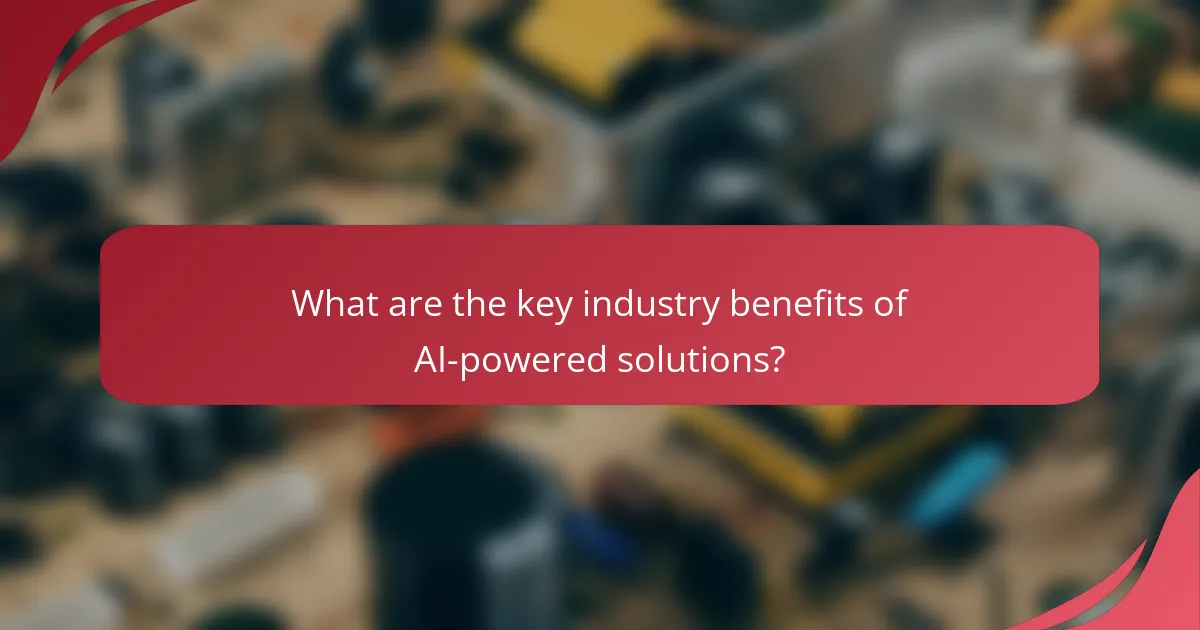
What are the key industry benefits of AI-powered solutions?
AI-powered solutions offer significant advantages across various industries, primarily through enhanced efficiency, cost savings, and improved decision-making. By leveraging real-time data processing, businesses can optimize operations and respond swiftly to market changes.
Cost reduction
Implementing AI-powered solutions can lead to substantial cost reductions by automating repetitive tasks and minimizing human error. For instance, businesses can save on labor costs by using AI for data entry, customer service, and inventory management.
Additionally, AI can optimize resource allocation, reducing waste and improving operational efficiency. Companies often experience cost savings in the range of 20-30% when integrating AI into their processes.
Scalability
AI solutions provide businesses with the ability to scale operations quickly and efficiently. As demand fluctuates, AI can analyze data and adjust resources in real-time, ensuring that companies can meet customer needs without overextending their capabilities.
This scalability is particularly beneficial for startups and small businesses, allowing them to grow without the need for proportional increases in staff or infrastructure. Companies can often expand their services or product offerings with minimal additional costs.
Competitive advantage
Adopting AI-powered solutions can give businesses a significant competitive edge by enabling faster decision-making and more accurate forecasting. Companies that utilize AI can analyze market trends and customer behavior more effectively, allowing them to tailor their offerings to meet specific demands.
Furthermore, businesses that leverage AI technology often enhance customer experiences through personalized services, which can lead to increased customer loyalty and retention. Staying ahead of competitors often requires continual investment in AI capabilities to maintain this advantage.
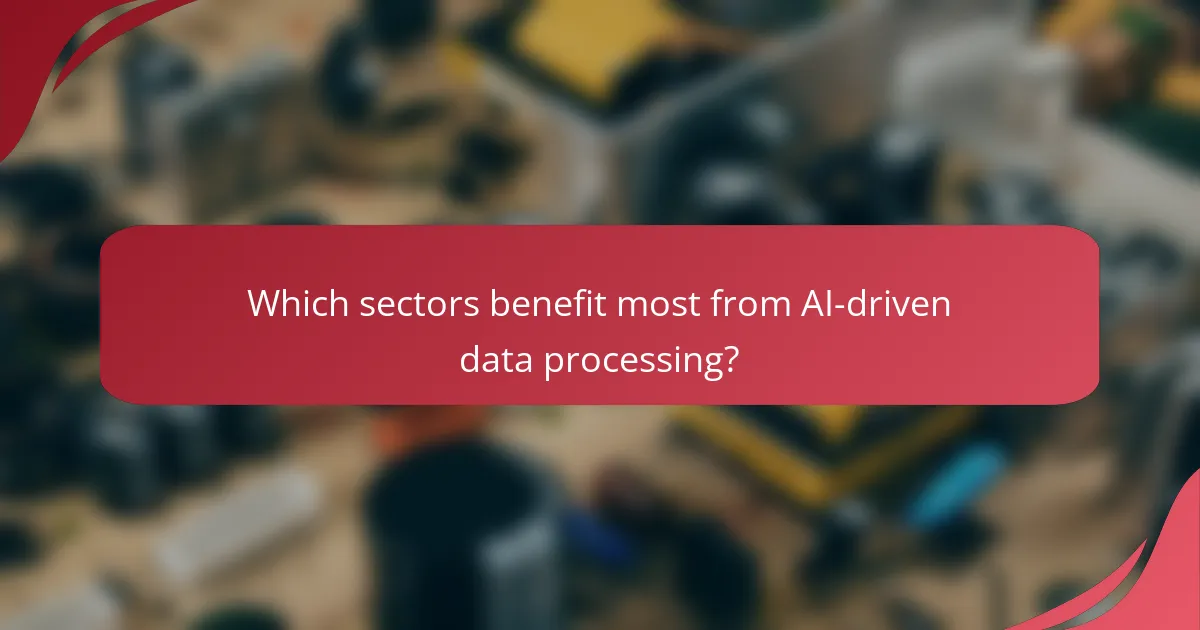
Which sectors benefit most from AI-driven data processing?
AI-driven data processing significantly enhances efficiency and decision-making across various sectors. Industries such as retail, healthcare, and manufacturing leverage real-time data to optimize operations, improve customer experiences, and streamline production processes.
Retail and e-commerce
In retail and e-commerce, AI-powered data processing enables businesses to analyze customer behavior and inventory levels in real-time. This allows for personalized marketing strategies and dynamic pricing, which can increase sales by responding to market trends swiftly.
Retailers can implement AI tools to predict stock needs, reducing overstock and stockouts. For instance, using predictive analytics can help maintain inventory turnover rates between 5 to 10 times per year, depending on the product category.
Healthcare
Healthcare providers benefit from AI-driven data processing by improving patient care and operational efficiency. Real-time data analysis helps in diagnosing conditions faster and managing patient records more effectively, leading to better health outcomes.
For example, AI algorithms can analyze medical images within seconds, significantly reducing the time for diagnosis. Hospitals adopting these technologies may see a reduction in patient wait times by 20-30%, enhancing overall patient satisfaction.
Manufacturing
In manufacturing, AI-driven data processing optimizes production lines and supply chain management. By analyzing data from machinery and supply chains in real-time, manufacturers can predict maintenance needs and avoid costly downtimes.
Implementing AI solutions can lead to efficiency gains of 10-20% in production processes. Companies should focus on integrating IoT devices with AI systems to monitor equipment health and streamline operations effectively.
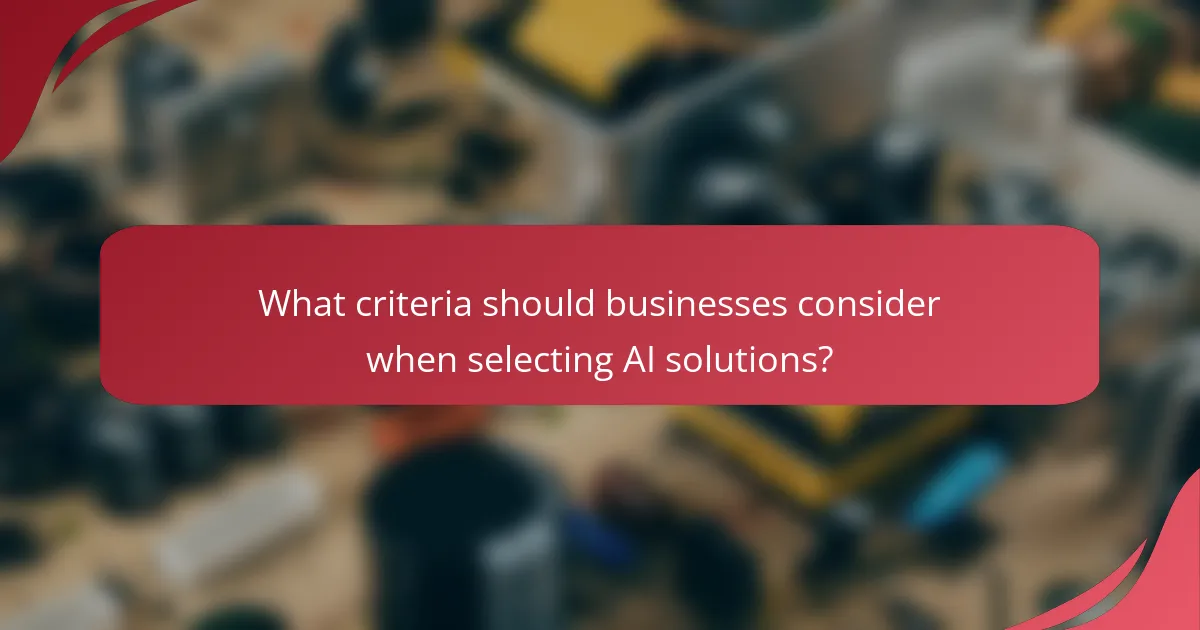
What criteria should businesses consider when selecting AI solutions?
Businesses should consider integration capabilities, data security features, and vendor reputation when selecting AI solutions. These criteria ensure that the chosen technology aligns with existing systems, protects sensitive information, and comes from a reliable provider.
Integration capabilities
Integration capabilities refer to how well the AI solution can connect with existing software and systems. A seamless integration minimizes disruption and enhances overall efficiency. Look for solutions that support popular APIs and data formats to ensure compatibility.
Consider the complexity of your current infrastructure. If your systems are diverse, prioritize AI solutions that offer flexible integration options, such as cloud-based services or middleware. This can help avoid costly overhauls and reduce implementation time.
Data security features
Data security features are critical for protecting sensitive business information and complying with regulations. Ensure the AI solution employs strong encryption protocols, access controls, and regular security audits. This will help safeguard against data breaches and unauthorized access.
Evaluate whether the vendor adheres to industry standards, such as GDPR or CCPA, depending on your location. A solution that prioritizes data security will not only protect your business but also build trust with customers and partners.
Vendor reputation
Vendor reputation is essential when selecting an AI solution, as it reflects the provider’s reliability and quality of service. Research customer reviews, case studies, and industry awards to gauge the vendor’s track record. A reputable vendor is more likely to provide ongoing support and updates.
Consider reaching out to other businesses in your industry for recommendations. A vendor with experience in your specific sector may offer tailored solutions and insights that can enhance your implementation process and overall success.
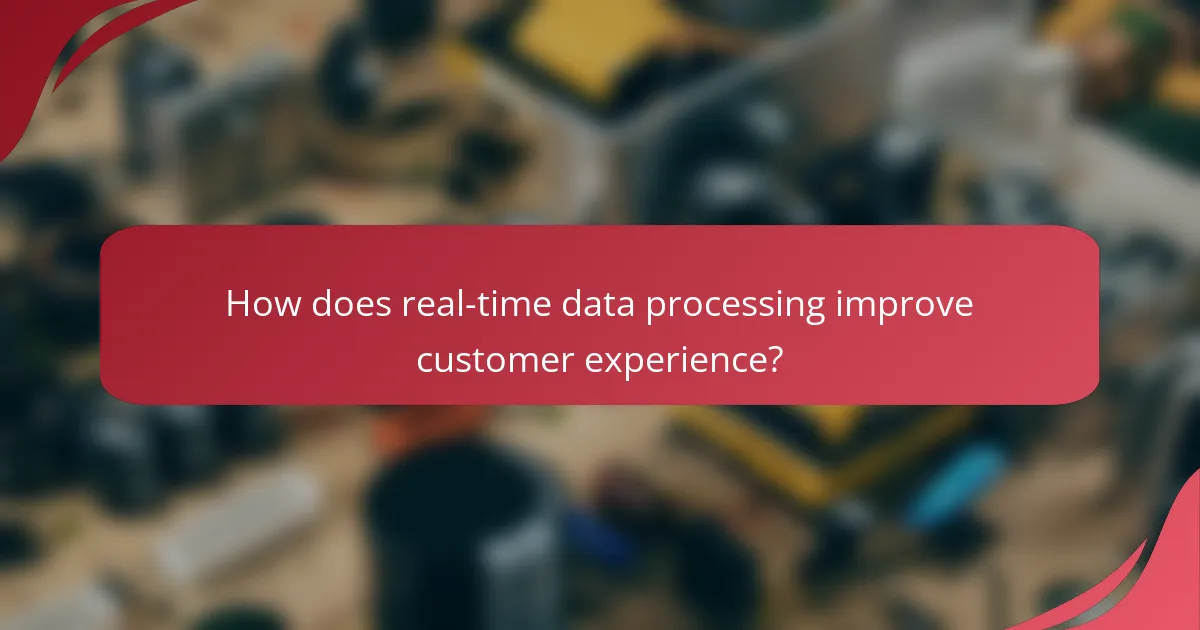
How does real-time data processing improve customer experience?
Real-time data processing enhances customer experience by enabling businesses to respond instantly to customer needs and preferences. This immediate access to information allows for tailored interactions, faster service, and proactive support, ultimately leading to higher satisfaction and loyalty.
Personalized recommendations
Real-time data processing allows businesses to analyze customer behavior as it happens, leading to personalized recommendations. For example, e-commerce platforms can suggest products based on a customer’s browsing history and current trends, increasing the likelihood of a purchase.
To implement this effectively, companies should utilize machine learning algorithms that adapt to user preferences over time. This can lead to conversion rates improving by significant margins, as customers feel understood and valued.
Faster service delivery
With real-time data processing, businesses can significantly reduce service delivery times. For instance, restaurants can use live order tracking systems to provide customers with accurate wait times, enhancing their dining experience.
To achieve faster service, companies should integrate automated systems that can process orders and requests instantly. This not only improves efficiency but also helps in managing customer expectations effectively.
Proactive customer support
Real-time data processing enables proactive customer support by identifying issues before they escalate. For example, a telecommunications company can monitor network performance and alert customers about potential outages, allowing them to address concerns proactively.
To leverage this capability, businesses should invest in analytics tools that provide insights into customer interactions and potential pain points. This approach can lead to a reduction in support tickets and an overall improvement in customer satisfaction.
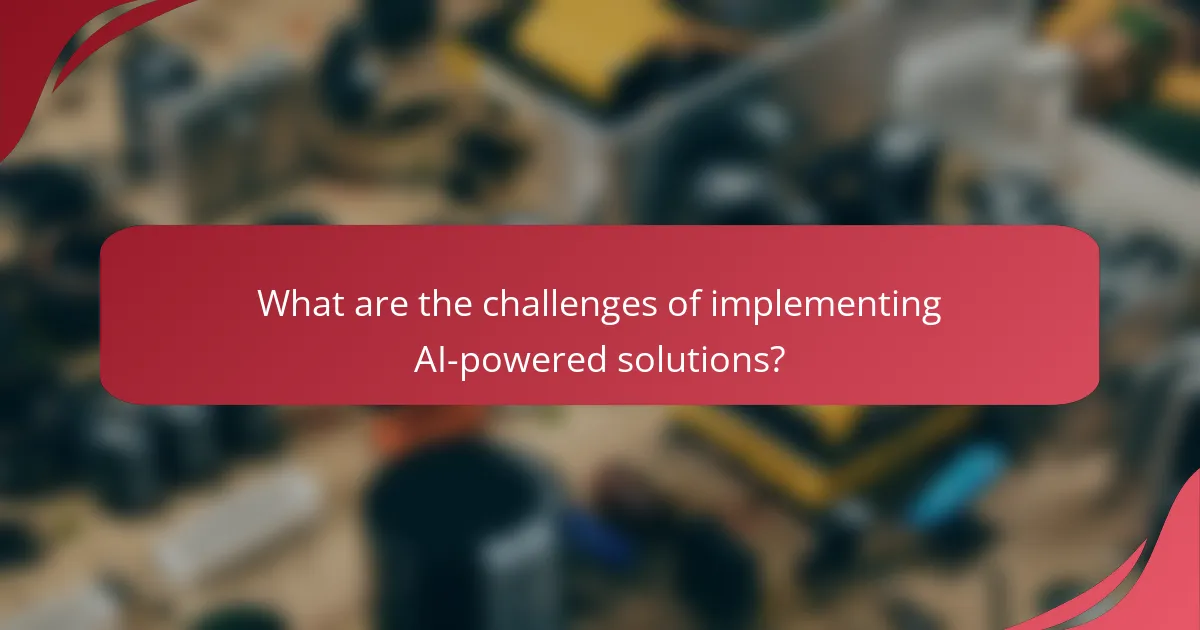
What are the challenges of implementing AI-powered solutions?
Implementing AI-powered solutions presents several challenges, including high initial costs, integration complexities, and the need for skilled personnel. Organizations must carefully navigate these obstacles to fully leverage the benefits of AI technologies.
High initial costs
The high initial costs of AI-powered solutions can be a significant barrier for many businesses. These expenses often include software licensing, hardware upgrades, and the investment in data infrastructure necessary for effective AI deployment.
Additionally, companies may need to allocate funds for training employees or hiring specialists to manage and maintain these systems. Depending on the scale of implementation, initial costs can range from thousands to millions of dollars, making it crucial for businesses to evaluate their budget and expected return on investment.
To mitigate these costs, organizations should consider phased implementation strategies, starting with pilot projects that require lower investment. This approach allows businesses to test AI solutions on a smaller scale before committing to larger expenditures.
